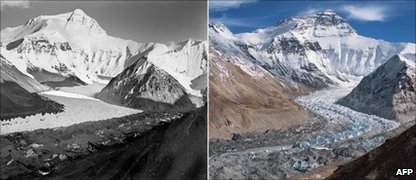You please quote where I said ANYTHING about carbon dioxide? I didn't think so. Next time don't put words in my mouth by fabricating an argument I never even made.
It's a thread on "global warming".
Nut cases who worry about natural cycles and like to pretend they're man-made also believe that CO2 is a "pollutant".
Silly of them, but no sillier than believing that human activity can alter an entire global ecology.
Tell us, oh Guru of things Gore, what caused end of the turn around from the Little Ice Age?
I'm not saying that modern advances haven't made worthy progress with curing diseases that have plagued our nations for thousands of years, but it's myopic to say that only the elderly have to worry about cancer. Cancer was considered an illness of the elderly a couple of centuries ago. Now children are born with cancer.
No, it's not. When one burbles up a meaningless "one in four will blah blah blah" for a whoe population, one is forced to consider the implications and bases for such claims.
Figures don't lie, but liars do figure.
More and more young adults are developing cancers, especially reproductive ones. Testicular cancer is the biggest thread to men in their 20's and 30's; breast and cervical cancer for women. Clearly our lifestyle is not healthy.
Clearly our young people have to get off their fat asses playing video games and drinking coke, and get outside playing football, fightig, and learning how to be independent, self-reliant, and free. And again, the numbers become problematic. There's something like three times as many people alive now than there were a hundred years ago. So when you say "there's more cases of rot your balls off" today, is that in real terms, or is it statistically adjusted to account for the number of young that no longer die of measles and reubella and polio and pertussis? What is the effect of simply from the urbanization of society, when there were finally more people living in cities than on the farms (thanks, of course, to the technological society that some disapprove of...)
Certain kinds of people like to freak out over microwatt exposures to cell telephone usage. Good thing we never tell them about the beta radiation coming from old fashioned TV CRT screens.
And, oh by the way. You're citing alleged statistics pertinent to a specific animal species, who's living in it's own filth. You're failing to show that human activity has any significant impact on global climate.
We have cured the virulent diseases for the most part, only to replace them with other diseases of excess.
Well, yes, that's what happens.
People don't live forever. They have to die of SOMETHING. So today, more people die of cancer than pneumonia. And what were previously minor causes, become significant once the biggest killers of the past are controlled. (See anyone die of smallpox recently?)
What a red herring. No one is suggesting that we return to the stone ages in order to save the environment. I think the most practical ideas that are on the table involve supplementing fossil fuel energy with green energy resources. They might lack the capacity to completely replace fossil fuels but we can still reduce the impact to our human health. I mean, people are busy fighting over the government controling the world because of global warming debates, but there are very real human health impacts taking place due to pollution that has been known for half a century now.
Chicago and New York City have some of the highest respiratory infection rates in North America, and TB is making a come back. Cold weakens your lungs. So does pollution. Childhood asthma rates are the highest in recorded history, and the rates continue to rise. Pollution also affects food and water quality, cancer rates, heart disease rates, our natural resources, etc.
And why is TB making a comeback? Ain't got NOTHING to do with the urban environment, no, not at all. It has everything to do with the fact that evolution never stops.
Fact of the matter is that SOME anti-pollution arguments are good and valid, and NO anti-pollution argument has an business being on a thread focused on global warming, because pollution isn't affecting global climate.
Another fact, since this is a thread on global warming, is that the last major glacial interstadial was eventually warmer the current one is at present, the sea levels were sigificantly higher, and the planet didn't have any humans runs fossil fueled industries to drive it. Our knowledge of climate is simply inadequate to explain that.
Our knowledge of climate is inadequate to explain why the Little Ice Age stopped. Clearly event was not driven by human activity, and since we do not know the processes that started the current warming trend, we're hard put to claim their stopped, and thus we're also unable to say how much, if any at all, human activity has played in recent short-term warming and cooling trends.
The one thing we do know, with certainty, is that human activity cannot so degrade climate that life, including human life, becomes impossible.


